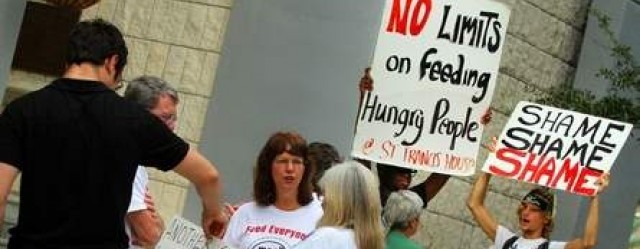By Chad Smith
The campaign to end Gainesville’s soup-kitchen meal limit scored a major victory Thursday after the City Commission voted unanimously to repeal the controversial code in favor of a three-hour window in which anyone can eat.
Earlier in the day, the commission voted down a unpopular proposal to get rid of free parking downtown, but the focus was on the final item of the agenda.
Opponents of the 130-meals-per-day cap on soup kitchens filled the City Hall auditorium, sitting through a number of items before theirs was finally heard.
Indeed, advocates for the homeless and opponents of the meal limit have been frustrated with how long it took for the petition to repeal the limit to reach the commission.
That boiled over when Pat Fitzpatrick, an outspoken advocate and three-time commission candidate, started an outburst during another item, asking why it couldn’t be heard earlier.
“We’ve got a lot of people that want to talk about hungry children,” Fitzpatrick said before a police officer escorted him from the auditorium.
Of the 21 people who did speak, 19 were adamantly in favor of the petition.
Timothy Ray, a 72-year-old retired social worker, said coming off the “great recession” and with the economy still in dire straights, “none of us … can be sure we won’t find ourselves homeless and hungry.”
“I pray that you will bring our community to a higher moral ground than we’ve been lo these many months,” Ray said, referring to the span that the city has been enforcing its 130-meal limit laid out in Section 30-111 of the city’s codes.
In 2009, the city started enforcing the limit after complaints from a downtown developer that the St. Francis House, a shelter and soup kitchen on South Main Street, was feeding more than 130 people a day.
St. Francis House, the only institution regulated under the limit, filed a petition earlier this year to lift the cap and exchange it with a three-hour time frame.
The time limit was a point of contention for some advocates, but most felt it was a good compromise.
In March, the City Plan Board, a resident advisory board, approved the petition, sending it to the commission for a vote.
On Thursday, the commission gave its seal of approval with a 6-0 vote; Commissioner Randy Wells was absent.
The city attorney’s office will now draft an ordinance that the commission will have to approve in two more votes.
Then St. Francis House will have to apply for a permit under the newly adopted ordinance.
Kent Vann, the shelter’s executive director, said he would submit his application with the city next week so it can move ahead as soon as the commission casts its final vote.
Asked about the perceived slow process for the commission to hear the petition, Vann said the time was necessary to get all the stakeholders on board and build consensus among commissioners.
“We needed that,” he said.
After Mayor Craig Lowe signaled his support for the petition last month, it became clear there were enough votes for it to pass.
But advocates were cautiously optimistic.
They let loose after the vote Thursday, erupting in applause and cheers, which are against the commission’s rule.
“I knew it was going to happen,” Lowe said. “That’s OK.”
Parking proposal denied
The commission on Thursday rejected a staff proposal to eliminate free parking downtown.
With public reaction strongly against the proposal, commissioners voted 6-0 to send most of it back to the Recreation, Cultural Affairs and Public Works Committee for more research.
The recommendations, stemming from a 2-year-old study by a consultant, called for installing meters at the city’s free, on-street parking spaces and expanding enforcement times from 5 p.m. to 11 p.m.
Many downtown shop and restaurant owners opposed the proposal, saying it would kill business. Cliff Nelson, the owner of the Paramount Grill, said the issue stemmed from a lack of affordable parking for downtown employees. That’s why city staff and the consultant observed employees occupying a significant chunk of free spaces that could be used by customers.
Mayor Craig Lowe said he thought those plans were more suited for a larger city and were “far more than is called for at this time.”
“It may be that we get to that point, and I think we all want to get to that point,” Lowe said, referring to growing downtown.
Gainesville Ends Feeding Limit



